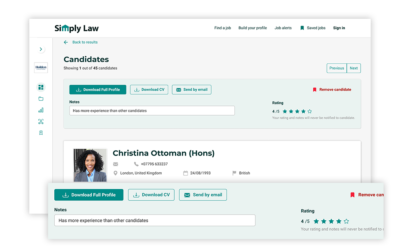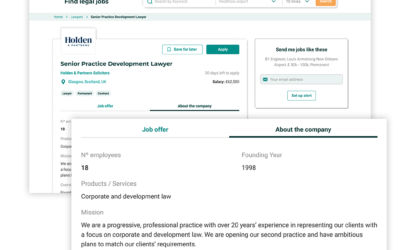Law firms often talk about a war for talent. Michael McGaw, a director at legal recruitment consultancy Nelson Chambers, discusses some of the ways firms can attract the right candidates.
Is there a shortage of skills in the legal industry?
There is not necessarily a shortage of skills. The reality is there are lots of firms looking for the same thing. The problem is they’re all looking in the same way and the same place. The pool in which they fish is full of other firms and other recruiters; and when they engage somebody from that pool, the candidate is speaking to four or five other firms. So that’s where there is a war for talent.
All these candidates are proactive in the market, are prospecting their candidacy to as many people who will look at it. They may already have left their current position. The firms who successfully recruit within a very stringent set of timescales are doing the best thing, which is to use proactive headhunting measures and to engage a candidate on that basis.
There probably isn’t a shortage at any level. If you’re only looking in 10% of the market place, you’re only going to find 10% of the candidates, but the legal market is enormous. And at an entry-level, the same volume of candidates comes through the system every year.
Are more technology skills sought after in law firms right now?
It depends on the firm. If you look at a traditional law firm, then the need for technology is probably less than some of the more modern, dynamic law firms that do embrace technology. But those firms with ageing partners who have worked their career doing certain things a certain way may have to embrace that technology or get left behind.
What other attributes are firms seeking in candidates?
Outside of a very, black and white technical level of expertise across technology, law, and anything else in a professional environment, what people are most interested in now, is: Does this person fit with my team? Do they have the right attitude? Where do they want to be in five years?
All of that softer side of the skill spectrum is a lot more important than it would have been six or seven years ago. People want to employ someone who will stay. Currently, people don’t tend to stay in jobs any more than four years. Whereas for previous generations it was maybe twice that.
And what’s going to make them stay, is their personality and if the organisation fits with the direction the candidates going in from a personal career point of view.
We do a personality profile for a lot of our candidates, and it gives us something we can share with the client in the early stages of the process to help sift out anyone who doesn’t fit their dynamic of the firm.
Some candidates are very driven and motivated to climb the management ladder, which is excellent. But others are happy doing what they’re doing. They’re not career orientated; all they want to do is practice law. They don’t want to become a partner and have all the extra remuneration and extra hassle that goes with that.
Are you seeing more people in the industry who are content not to seek out management positions?
Absolutely. And any firm that isn’t recognising the work-life balance and putting measures in place, such as options to work from home, flexible working hours etc. they’re going to be left behind if they haven’t already. Some of the biggest firms in the country are doing that. Some won’t, and don’t want to, but on the whole, that is a huge part of a candidate’s consideration.
When you offer somebody a job, there’s a basic salary, a pension, and tangible benefits, but the stuff that isn’t tangible is of equal importance. I’ve seen people who’ve had two offers on the table, and they’ve accepted the one that’s ten grand less so that they can have the flexibility in their life.
What role does inclusion and diversity play in attracting candidates?
Something we always say to candidates when they go to interview is: bring live examples of your success rather than saying I have done this, or I have done that. And that is the same for employers. When a firm says to a candidate that they offer excellent progression no matter who you are, or what you are. It helps to have a case study in your business that demonstrates that. That’s something we would always ask.
[simplyjobs site_url=”https://www.simplylawjobs.com/” placement=”post” site_name=”Simply Law Jobs” username=”SEO_TEAM” password=”fmgseo” feed_identifier=”blog_SLJ” category=”jobs”][/simplyjobs]
How to save yourself headhunting time with the Talent Pool
In our latest guide, we’ll be introducing you to the Talent Pool, which is a brand-new feature for our recruiters; we’ll also demonstrate how using this can save you time and effort within your recruitment process. Saving candidates to your Talent Pool The...
Managing your response – job advert in need of a boost?
In our latest guide to the new features of your Recruiter account, we’ll be demonstrating how you can proactively manage your adverts’ response using our new Response Boosters. Should you wish to give a little extra push to one of your job adverts in order to attract...
Why it’s so important to keep your applicant pipeline up to date
In our latest guide to the new and improved features of your Recruiter account, we’ll be showing you how to access and manage your applications via your Jobs Area. Accessing your applications To view the applicants for a job, simply navigate to the Jobs Area...
How to monitor and manage your job adverts all in one place
Next in our series of guides to the new and improved features of your Recruiter account, we’ll be showing you around the Jobs Area. You can access your Jobs Area via the main navigation menu on the left hand side of your dashboard; this is where you’ll be able to...
Mental health in the workplace: 4 ways to take it seriously in 2021
It’s difficult to gauge the extent to which action on mental health in the workplace has followed discussion of its significance in recent years. The latter, at least, is inarguable. The need to approach workers with broad empathy (treating them as precious assets...
Why it’s so important to keep your company information up to date
In the latest of our guides to getting the best out of your Recruiter account, we’ll be looking at how you can update your key company information and manage your account’s users, as well as where to go to find answers to any questions you may have. About your...








